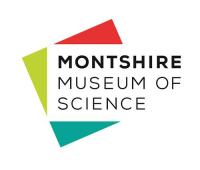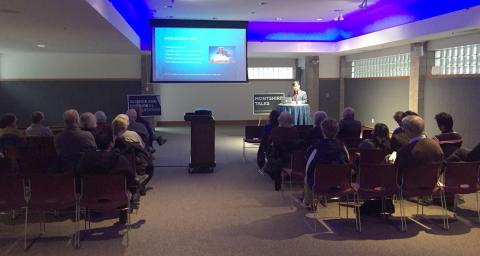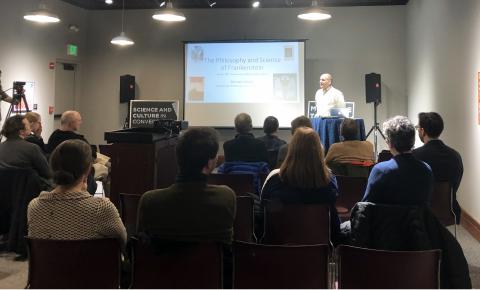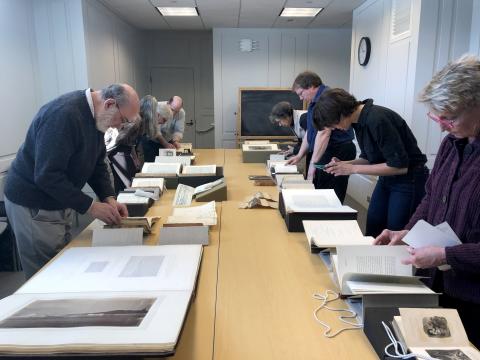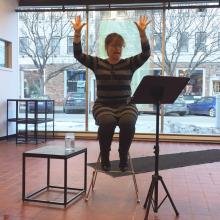Every year, the Montshire Museum of Science in Norwich, VT hosts a conversation series that explores a range of scientific topics. This year, in participation with Frankenstein200, the Montshire Talks focused on the 200th anniversary of the publication of Mary Shelley’s Frankenstein; or the Modern Prometheus. Through her seminal work, Shelley sparked the imaginations of generations who ponder the necessary balance between progress and ethics.
Guest speakers from Dartmouth College, University of Vermont, and Northern Stage Theater, discussed the philosophy of science, artificial intelligence, the evolution of a modern myth, and Mary Shelley’s lasting influence on the questions: What is life?; Why do we create?; and What are our responsibilities as creators, scientists, and engineers? The museum also partnered with a local TV station to record and broadcast the Montshire Talks, making these conversations available online.
This year’s Montshire Talks were:
Frankenstein and the Philosophy of Science, featuring Dr. Michael Ashooh (March 6). From a philosopher’s perspective, Mary Shelley’s Frankenstein operates on several levels: a philosophical exploration of what it means to be human, the nature of science and scientific knowledge, and the role of the scientist in society. Contextualizing these philosophical and scientific issues helps us see Frankenstein as a fascinating and provocative exploration of questions about human nature and the human condition, the quest for knowledge, and the nature of moral responsibility. Dr. Michael Ashooh, who specializes in the philosophy of science at the University of Vermont, explored the context in which Frankenstein was written, as well as the lasting scientific and moral questions raised by this modern myth.
Frankenstein in Text and Image, featuring Morgan Swan (March 20, in Rauner Library, Dartmouth College). Dr. Frankenstein's creation wasn’t always the big, green monster our imaginations conjure. How did Mary Shelley’s text inspire artists and writers throughout time? A field trip to the Rauner Library on Dartmouth College Campus gave audience members the opportunity to explore the first illustrated edition of Mary Shelley’s Frankenstein and the works that inspired it. With the expertise of Morgan Swan, Special Collections Education & Outreach Librarian, participants were able to see how the image and text of Frankenstein changed over the last 200 years.
Artificial Intelligence and Responsible Design, featuring Eugene Santos (March 27). In Mary Shelley’s Frankenstein, a creature comes to life to terrorize his creator’s family. What happens when the creature is no longer flesh and bone, but an algorithm? Artificial intelligence is a technology that is advancing at a rapid rate and is helping to speed up innovations around the world. What happens when humans are no longer at the helm of complicated decision making processes? A professor at Dartmouth College’s Thayer School of Engineering, Dr. Eugene Santos discussed what exactly artificial intelligence is and can do, and the implications of this technology on society.
Finding Frankenstein: In Search of Mary Shelley, featuring Amanda Rafuse (April 5) Who was Mary Shelley, and how did she compose a myth that would inspire the ages? Finding Frankenstein: In Search of Mary Shelley, a play written by Dawn Brodey and Tim Barrett for the Bakkan Museum, explores the complicated past and legacy of Mary Shelley and the questions her work has sparked for generations. Northern Stage’s Associate Director Amanda Rafuse presented a dramatic reading of this museum theater piece that delves into the life and times of Mary Shelley.
The Montshire also partnered with the Hopkins Center for the Arts at Dartmouth to screen the digitally restored 1931 film adaptation of Frankenstein (March 23). This cinema classic set the gold standard for the horror genre and sparked the iconic image of Frankenstein’s monster, as played by Boris Karloff.
For more information on the Montshire Talks, visit www.montshire.org/talks.
The Montshire Talks, as well as an interview with Montshire Executive Director Marcos Stafne, are available to view on the Montshire’s YouTube Playlist, Montshire Talks: Frankenstein200 — https://bit.ly/2uO3wGC

